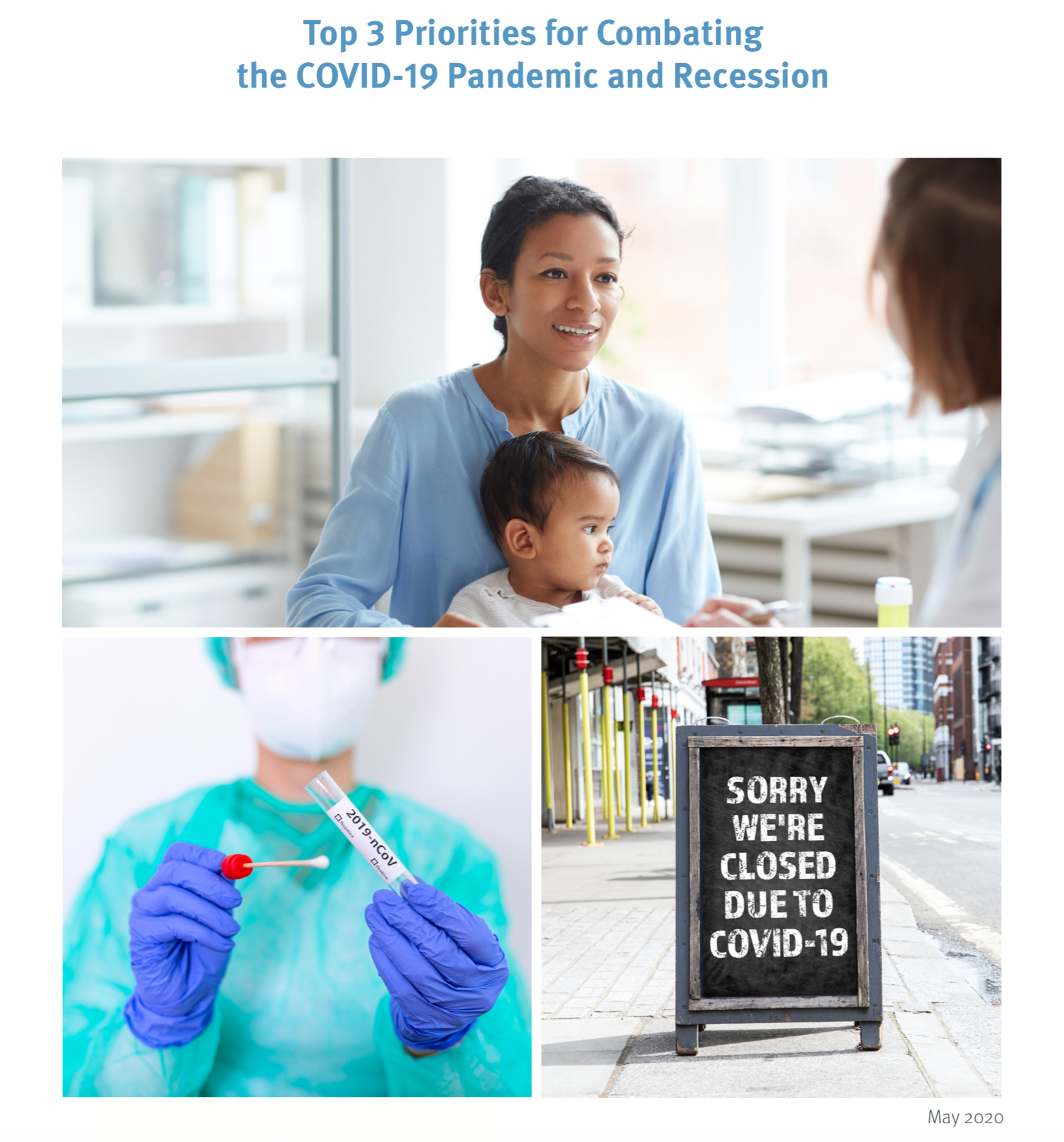Top Three Priorities for Combating the COVID-19 Pandemic and Recession Digital Leave-Behind
05.07.2020
Key Messages
America is in the throes of a profound crisis: deadly disease, economic downturn, and an erosion of families’ financial security. Our elected leaders must act boldly now on behalf of families, to protect their health and financial wellbeing, and to stymie the nation’s gravest pandemic and health-incited recession in generations. Every person in America needs access to high-quality, affordable healthcare and policies that protect their financial security, all which are necessary for overall health and wellbeing.
The President and Congress must put people — frontline workers, unemployed, uninsured and underinsured, children, people of color, people in rural communities, regardless of immigration status — over corporate interests and partisan politics with three critical policies — coverage, state fiscal relief, and testing — that ensure families’ health and economic security, during the COVID-19 crisis and beyond.
1. COVERAGE
America’s families need access to comprehensive, affordable health coverage. Tens of millions of workers and their families are losing employer-sponsored health insurance due to pandemic-prompted layoffs and furloughs. The growing coverage loss will worsen disease spread and the financial crisis for families as they seek care, unless Congress acts now by: providing $600 million in mandatory, annual funding for consumer assistance so families can get the coverage and care they need; making private health insurance affordable for struggling families by broadening premium tax credits and fully subsidizing COBRA coverage offered to laid-off workers; and by expanding the recently-enacted Medicaid option to support states’ ability to finance and expand Medicaid, including COVID 19 treatment, with eligibility extended to all in need, regardless of geography or immigration status.
2. STATE FISCAL RELIEF
States need fiscal relief to staff pandemic response, save jobs and help hard-pressed residents. Recession slashes state revenue while boosting the number of families using state programs related to health care, unemployment assistance, and food security programs, to name a few. This combination leaves states little choice but to make major cutbacks that harm people and devastate the economy when both need help. To allow for appropriate COVID-19 response and to prevent state and local actions that undermine Congressional efforts to combat recession, federal fiscal relief must include two key components:
- a significant increase in federal matching rates for Medicaid; and
- flexible funding for states to offset major revenue losses and cost increases triggered by recession. Congress should immediately enact the governors’ (National Governors Association) proposal for a $500 billion state emergency relief fund.
3. TESTING and CONTACT TRACING to SAFETY BEYOND LARGE-SCALE LOCKDOWNS
To re-open the U.S. economy and keep families safe, a comprehensive effort to test, trace and quarantine individuals must be nationally coordinated and implemented in states and localities across the country. In the next COVID package, lawmakers must fund these essential efforts with a priority on getting resources to communities at greater risk of COVID-19 outbreaks and those that lack the ability to stand up robust efforts on their own. In particular, they should fund the Centers for Disease Control and Prevention (CDC) at least $3.7 billion in emergency supplemental funding to be distributed to local, state, territorial, tribal, and federal public health agencies to support a force of at least 100,000 contact tracers, with an additional $43 billion available to CDC to expand the contact tracing workforce if needed, to implement self-isolation facilities, and to provide income supports for individuals in 14-day isolation periods. States should submit binding plans to allocate these funds within the state based on disease prevalence and local public health staffing needs, prioritizing communities with limited fiscal capacity to stand up pandemic response quickly.

Click the download button below to view the full Digital Leave-Behind.
